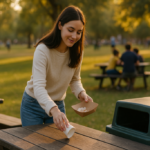I remember visiting a friend’s tiny studio apartment years ago and noticing how light she seemed.
She didn’t have stacks of possessions or a mile-long list of daily obligations.
She just had her basics, a few beloved items, and a sense of calm that radiated in every corner of her home.
That visit made me question my own life.
I thought about how people who seem content with “less” consistently display genuine ease, and I wanted to understand how they accomplish that.
Over time, I realized it’s not magic. It often comes down to simple but impactful rules they quietly live by.
Below are eight guiding principles I’ve observed, researched, and practiced.
I’ve seen them make a difference in how we feel, how we connect, and how we find satisfaction that goes far beyond material gain.
They define their own idea of “enough”
They don’t let external voices dictate how much they should have or achieve.
That sense of “enough” looks different for everyone.
Some might want a small living space and flexible work hours. Others might prefer a stable career and a tight circle of meaningful connections.
According to research from NIMH, individuals who are clear on their personal goals and limits tend to experience less stress and greater overall well-being.
When we aren’t chasing someone else’s version of success, we free ourselves to focus on what genuinely enriches our lives.
I remember going through my own defining moment when I finally decided I didn’t need every new gadget on the market.
My focus shifted, and I felt relief.
No more worrying about the latest tech release—just a clearer sense of what mattered to me.
It can be uncomfortable at first because it requires looking inward.
Yet the reward is the calm that comes with knowing where your boundaries are and respecting them.
They keep their environment clutter-free
I’ve noticed that folks who thrive with less pay attention to their surroundings.
Minimalism in the home often translates to minimalism in the mind.
Clutter can overwhelm us, making it harder to stay centered and focused on priorities.
Clearing out what isn’t useful or meaningful gives us more room to breathe.
I like to do a small decluttering routine every few months, especially before a new season starts.
It feels like a fresh start every time.
They protect their mental space
Possessions aren’t the only things that can clutter our lives.
Excessive social commitments and digital distractions drain mental energy too.
People who live quietly and contentedly often set limits on how many events they attend or how often they browse social media.
It isn’t about shutting out the world.
It’s about choosing where and how to invest their attention.
I recall reading a quote by Dr. Gabor Maté where he emphasized the importance of feeling grounded rather than pulled in every direction.
It resonated because so many of us are in constant motion, yet we rarely pause to check if we truly want to be.
According to the APA, practicing daily mindfulness can significantly reduce stress levels.
That small routine can be as simple as sipping tea in silence or going for a short walk without your phone.
It’s a moment to reconnect with yourself before diving back into the day’s tasks.
They practice mindful spending
Being intentional with money is a huge part of living contently with less.
Rather than collecting random purchases, they focus on what adds real value.
I’ve learned a few practical strategies from people who handle this with grace:
They pause before buying: A quick break to consider if the purchase aligns with their values or will genuinely improve their daily life.
They track expenses without obsessing: A simple overview each month gives them a sense of control.
They invest in experiences: Whether it’s a weekend getaway or a workshop, they lean toward something that creates lasting memories.
These steps turn spending into a conscious act rather than a mindless habit.
When I shifted into mindful spending, I noticed I had more to allocate toward things that genuinely enriched my life, like a yoga retreat or a specialized cooking class.
They invest in deeper connections
People who find contentment with fewer things often place a higher value on relationships.
They don’t spread themselves thin trying to maintain superficial ties with hundreds of acquaintances.
Instead, they nurture the bonds that feel mutually supportive and respectful.
As Brené Brown once noted, true belonging starts with being authentic, even if it means not fitting certain societal expectations.
Those quiet souls I admire reflect this idea.
They’re not out to collect friends; they’re there to build real, lasting connections with the people who matter most.
When I first got married, I realized I had to reassess my social circle.
Too many events left me drained.
Slowing down and intentionally choosing my company made my relationships richer.
It’s a simple rule: energy and time go into the bonds you treasure, not the ones you maintain out of guilt or obligation.
They accept emotions without guilt
We sometimes think that people who are content with “less” must be immune to negative feelings.
That’s rarely the case.
Instead, they allow themselves to experience emotions fully, without shame.
I used to shy away from sadness and frustration.
Over time, meditation taught me that resisting emotions often prolongs them.
Now, I lean into them, observe them, and let them pass rather than burying them.
I’ve noticed similar patterns in people who practice mindfulness in all areas of life.
A NIMH study highlights that acknowledging our emotions, rather than suppressing them, supports better mental health and lowers anxiety.
It’s not a glamorous step, but it’s essential for living in genuine peace.
Acknowledging how you feel—happy, sad, confused—means you’re no longer at war with yourself.
They find meaning in small rituals
I love this part of a minimalist, mindful lifestyle.
Simple rituals can ground us in the present moment and remind us to be grateful for what we have.
For some, it’s a short yoga session at sunrise.
For others, it’s preparing tea with full attention on each step.
I’ve met people who close each day by writing down three things they’re thankful for.
These tiny rituals become anchors in an often chaotic world.
It doesn’t have to be a big production.
A few mindful breaths before eating a meal can change how you experience nourishment.
I’ve made it a habit to briefly close my eyes and offer gratitude for my food before I dig in.
It feels like a small, significant pause that helps me stay centered.
We’re almost done, but this piece can’t be overlooked.
Rituals, no matter how small, create continuity in our lives and add layers of calm to an otherwise busy day.
They remain flexible and open
Being content with “less” doesn’t mean living with strict rules that never shift.
In fact, the most balanced individuals I know remain open to new ideas and experiences.
Flexibility means understanding that minimalism or mindful living isn’t a strict box you confine yourself to.
It’s an approach that evolves as you do.
You might accumulate a few more items because your hobbies change, or you might clear your schedule because you need more downtime.
I’ve had phases when my writing workload spikes, and I need to re-evaluate my routine to stay balanced.
Other times, my life is so quiet that I add in new interests, like learning an instrument.
The main point is staying attuned to your own needs and adjusting gracefully.
When we resist new experiences or cling to one fixed definition of “less,” we risk missing out on personal growth.
Staying flexible allows us to adapt while still keeping hold of what truly matters.
Final thoughts
Living a life that thrives on fewer external pressures and possessions isn’t about deprivation.
It’s about making space for what nourishes you the most, whether that’s meaningful connections, creative outlets, or simply peace of mind.
Each of the principles here can guide you toward a gentler, more intentional way of living.
Try adopting one or two changes at first. See how you feel, and then adjust as you go.
I’ve found that staying honest with myself and leaving room for life’s surprises keeps me grounded yet adaptable.
You might discover something similar.
The journey isn’t always straightforward, but it’s worth it.
When we trust that less can be enough, we often end up with more clarity, more calm, and more genuine satisfaction.







